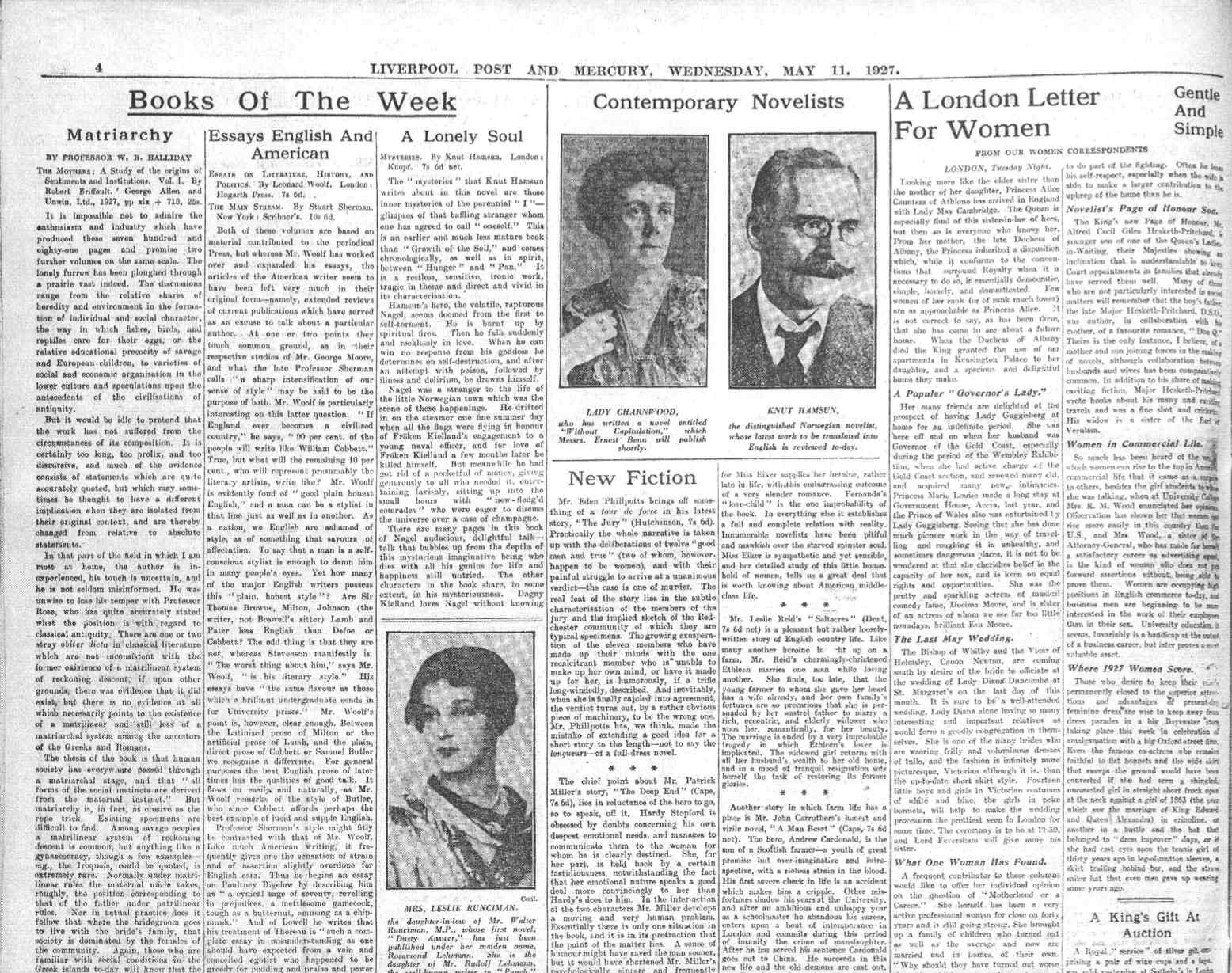
A. M. A. ŌĆ£ŌĆśTis WomanŌĆÖs Whole Existence.ŌĆØ The Liverpool Post and Mercury. May 11, 1927, p.4.
ŌĆśTis WomanŌĆÖs Whole
Existence
TO THE LIGHTHOUSE. By Virginia Woolf.
London: The Hogarth Press. 7s 6d net.
Mrs. RamsayŌĆÖs life-history was simple.
She was beautifulŌĆöin youth exceptionally
beautiful. She married a Professor
of Philosophy. They were poor, they
had eight children. But they kept open
house, and in the summer the family
used to go NorthŌĆöa shabby old barn of a
house by the sea, racked to pieces by
the eight children and the even more
numerous visitors. Mrs. Ramsay kept
everything going; she was the perfect
wife, the perfect mother, the perfect
hostess. Then in her fiftieth year she
died rather suddenly. The house stood
empty for ten summers. To it, at last,
came the widower, his children, his
visitors, with their memoirs, desolate,
sentimental, selfish, or merely faded.
Unless one knows Virginia WoolfŌĆÖs
delicate, baffling method of story-telling
it is difficult to suggest what she makes
of her theme, or why it should seem in
her hands so richly satisfying a rendering
of human life. She paints her subject
in vivid detail, turns it this way
and that, explores its very heart and
mind, so that you hear the heart beat
and the brain work. ŌĆ£Do you want to
know,ŌĆØ she asks us, ŌĆ£the thoughts
and feelings of a beautiful woman who
has dedicated her life and her beauty to
the cherishing of a husband, the rearing
of a family, the creation of a home?ŌĆØ
This is the accepted vocation of women,
but do women ever get enough out of it
to balance all they put into it? What are
the secret dreams and rebel thoughts of
the inner being behind the beautiful and
beneficent presence of the domestic
angel?
Virginia Woolf is too ardent a feminist
to accept the conventional assurance
that a life lived for others is the best and
happiest life. In exploring the secrets
of Mrs. RamsayŌĆÖs soul, she comes to an
inner chamber where the wife, the
mother, the friend with the match-
making instinct who is always throwing
her visitors together, the creature of
convention and habit never enters. In
that chamber is a shrine to the
relinquished dreams of Mrs. RamsayŌĆÖs
beautiful long-vanished youthŌĆöall that
she might have been and was notŌĆöas
big a sum though unreckoned as that
often-computed total of her husbandŌĆÖs,
with its heavy item of genius submerged
in domesticity. Over this question of the
value of Mrs. RamsayŌĆÖs life, and of life
itself, flickers the novelistŌĆÖs mournful
and sagacious fancy. Mrs. Ramsay had
been the rock on which her family rested
in security. A little gap of time and the
drift of life had made good her loss.
Everyone was perfectly resigned, and
poor Mr. Ramsay was really quite happy
in the role of elderly widower in need of
feminine sympathy. A. M. A.






